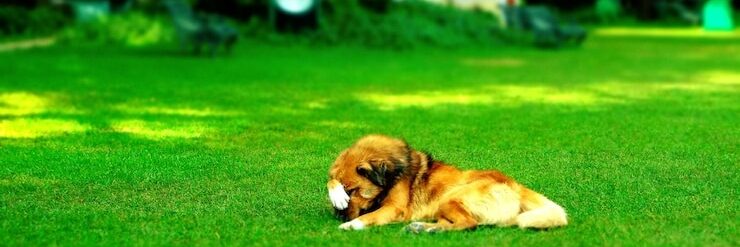The way we care for our outdoor spaces has been transformed by artificial turf, with its lush, green landscape that doesn’t require mowing, watering or fertilizing. It is especially liked by pet owners because it serves as a sturdy and pet-friendly alternative to natural grass.
In fact, an artificial turf Brisbane needs to be maintained regularly just like any other open ground else it will become smelly and look dirty especially under the influence of pets. Artificial Grass Brisbane offers a step-by-step guide on how you can clean pet waste from your synthetic lawn keeping both your pets and family in a safe and hygienic environment.
Prompt Cleanup
Prompt cleanup is the secret behind cleaner artificial turf in Brisbane. As soon as you see that there is animal waste on the turf, remove it without delay. Use either a pooper scooper or a plastic bag to pick up solid waste but make sure that they do not press it down into the fibres of the fake grass.
Hose Down
Secondly, hose down the area affected after removing all solid waste thoroughly. So rather than using plain water for washing out this mess from your lawn it’s important you employ nozzle attachment which will help you wash away any remaining residue due high pressure while decreasing odors around thus making these lawns appear refreshed.
Use a Turf Cleaner
For difficult stains or residual smells, consider buying an artificial turf cleaner specifically made for dogs and cats’ turfs. These cleaners are made specifically to break down urine and faeces, destroy bacteria causing odor yet they are still mild enough not to damage the fibers used in making synthetic lawns. Carefully follow the manufacturer’s instructions when applying it.
Natural Remedies
There are several natural remedies available if that is what you prefer. A mixture of white vinegar with water helps eliminate smells while baking soda absorbs moisture thereby removing smell too; simply sprinkle baking soda over affected area starting from the top, let it stay for hours, and vacuum it out afterwards.
Regular Maintenance
Preventing a buildup of pet waste and keeping your artificial turf in good condition will require establishing regular maintenance routine. This may include weekly hosing down, monthly deep cleaning with a turf cleaner and periodic brushing to groom the lawn by removing debris as well as fluffing up the fiber.
Avoid Harsh Chemicals
When cleaning artificial turf, do not use bleach or ammonia among other harsh chemicals since they destroy synthetic grass fibers and harm animals as well. Instead, use pet-friendly cleaners or natural remedies that will not cause harm to your pets or the environment.
Training and Prevention
The most practical way of minimizing pet feces on artificial lawns is through training animals plus preventing them from littering on these turfs. Train your pets to relieve themselves in particular parts of your compound while you should also keep watch for any signs that would show you when your dog wants to pee so as to avoid accidental pees. Furthermore, think about putting up barricades around the turfs such that animals are compelled not to get into them while unwatched.
Professional Cleaning
If all else fails in your attempts at keeping clean artificial turfs then you might want to consider hiring a professional service provider who specializes in cleaning this type of grass. These professionals have all equipment needed including those which can scrub deeply hence making them suitable for bringing back its original appearance.
By following these tips and incorporating them into your regular lawn maintenance routine, you can keep your artificial turf in Brisbane looking and smelling fresh, even with pets in the household. With prompt cleanup, choosing right cleaning products & being proactive about maintaining it; one can enjoy the advantages associated with having synthetic lawns without worrying about their children’s domesticated animals fouling all over them.
